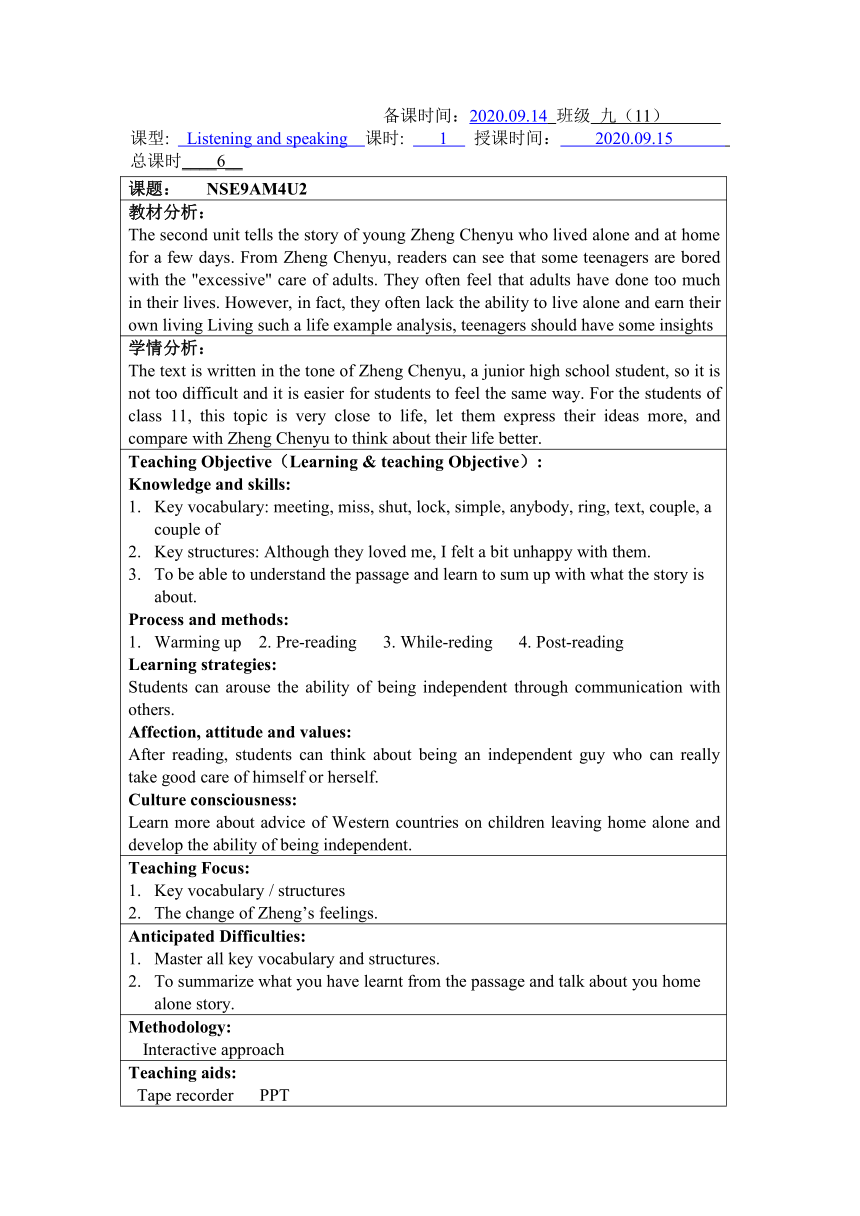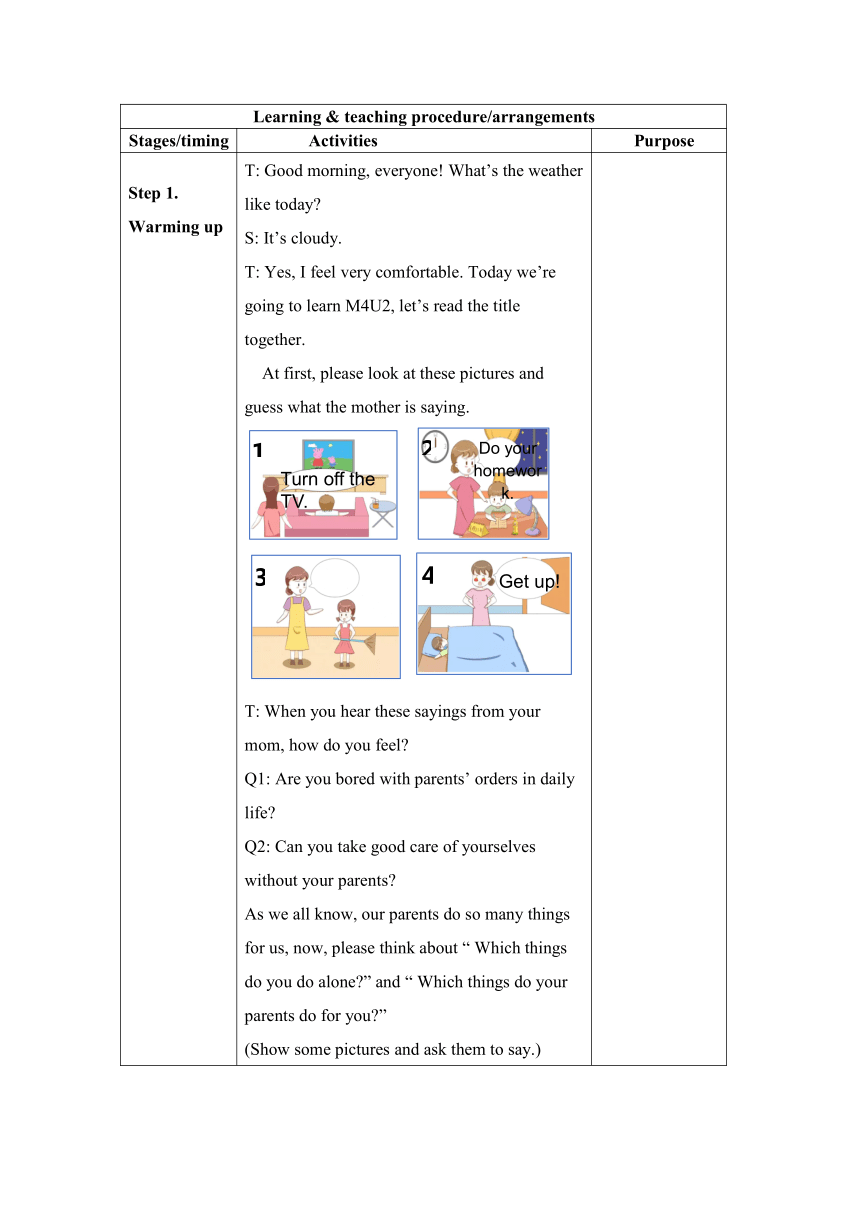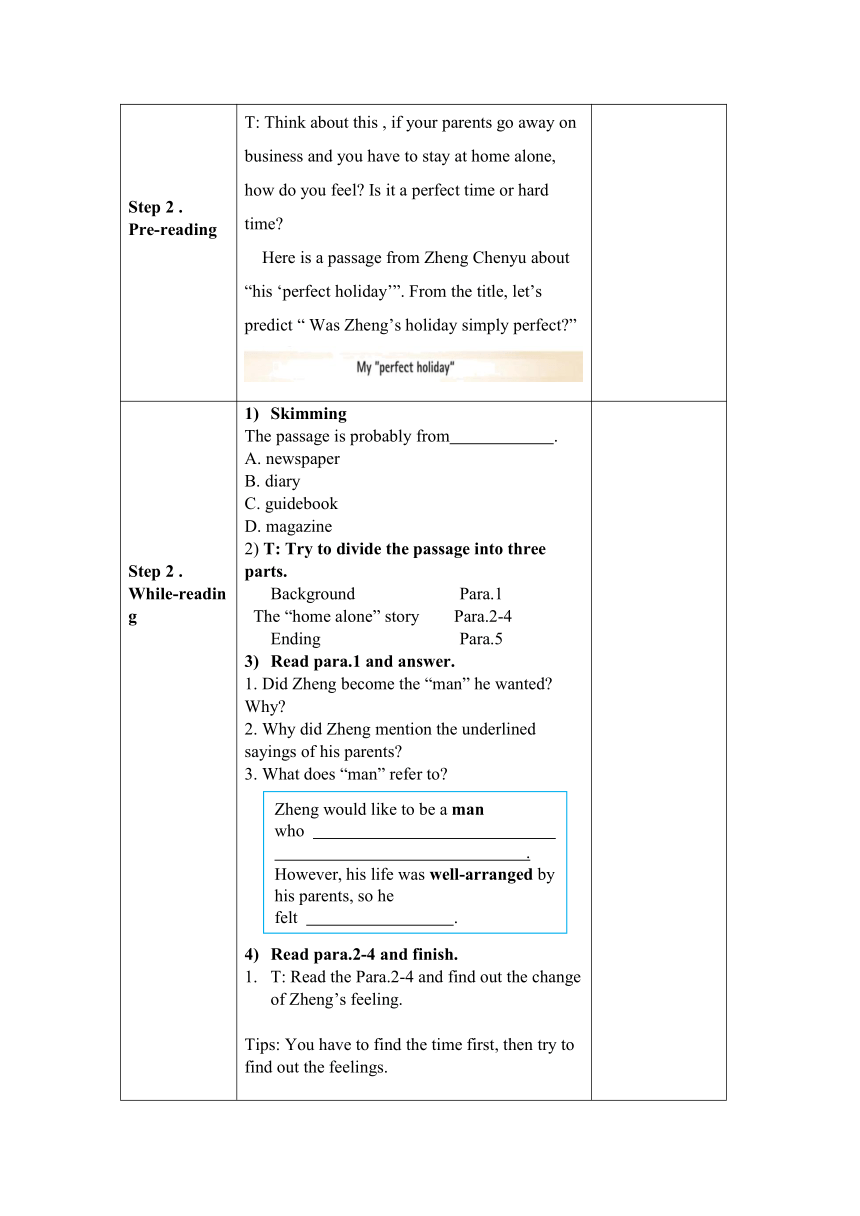外研版九年级上册Module 4 Home alone Unit 2 教案 (表格式)
文档属性
| 名称 | 外研版九年级上册Module 4 Home alone Unit 2 教案 (表格式) |

|
|
| 格式 | docx | ||
| 文件大小 | 2.2MB | ||
| 资源类型 | 教案 | ||
| 版本资源 | 外研版 | ||
| 科目 | 英语 | ||
| 更新时间 | 2023-09-06 13:46:37 | ||
图片预览



文档简介
备课时间:2020.09.14 班级 九(11)
课型: Listening and speaking 课时: 1 授课时间: 2020.09.15 总课时____6__
课题: NSE9AM4U2
教材分析: The second unit tells the story of young Zheng Chenyu who lived alone and at home for a few days. From Zheng Chenyu, readers can see that some teenagers are bored with the "excessive" care of adults. They often feel that adults have done too much in their lives. However, in fact, they often lack the ability to live alone and earn their own living Living such a life example analysis, teenagers should have some insights
学情分析: The text is written in the tone of Zheng Chenyu, a junior high school student, so it is not too difficult and it is easier for students to feel the same way. For the students of class 11, this topic is very close to life, let them express their ideas more, and compare with Zheng Chenyu to think about their life better.
Teaching Objective(Learning & teaching Objective): Knowledge and skills: Key vocabulary: meeting, miss, shut, lock, simple, anybody, ring, text, couple, a couple of Key structures: Although they loved me, I felt a bit unhappy with them. To be able to understand the passage and learn to sum up with what the story is about. Process and methods: Warming up 2. Pre-reading 3. While-reding 4. Post-reading Learning strategies: Students can arouse the ability of being independent through communication with others. Affection, attitude and values: After reading, students can think about being an independent guy who can really take good care of himself or herself. Culture consciousness: Learn more about advice of Western countries on children leaving home alone and develop the ability of being independent.
Teaching Focus: Key vocabulary / structures The change of Zheng’s feelings.
Anticipated Difficulties: Master all key vocabulary and structures. To summarize what you have learnt from the passage and talk about you home alone story.
Methodology: Interactive approach
Teaching aids: Tape recorder PPT
Learning & teaching procedure/arrangements
Stages/timing Activities Purpose
Step 1. Warming up T: Good morning, everyone! What’s the weather like today S: It’s cloudy. T: Yes, I feel very comfortable. Today we’re going to learn M4U2, let’s read the title together. (
2
) At first, please look at these pictures and guess what the mother is saying. (
Do your homework.
) (
1
) (
Turn off the TV.
) (
Clean your room.
) (
4
) (
3
) (
Get up!
) T: When you hear these sayings from your mom, how do you feel Q1: Are you bored with parents’ orders in daily life Q2: Can you take good care of yourselves without your parents As we all know, our parents do so many things for us, now, please think about “ Which things do you do alone ” and “ Which things do your parents do for you ” (Show some pictures and ask them to say.)
Step 2 . Pre-reading T: Think about this , if your parents go away on business and you have to stay at home alone, how do you feel Is it a perfect time or hard time Here is a passage from Zheng Chenyu about “his ‘perfect holiday’”. From the title, let’s predict “ Was Zheng’s holiday simply perfect ”
Step 2 . While-reading Skimming The passage is probably from . A. newspaper B. diary C. guidebook D. magazine 2) T: Try to divide the passage into three parts. Background Para.1 The “home alone” story Para.2-4 Ending Para.5 Read para.1 and answer. 1. Did Zheng become the “man” he wanted Why 2. Why did Zheng mention the underlined sayings of his parents 3. What does “man” refer to (
Zheng would like to be a
man
who
.
However, his life was
well-arranged
by his parents, so he felt
.
) Read para.2-4 and finish. T: Read the Para.2-4 and find out the change of Zheng’s feeling. Tips: You have to find the time first, then try to find out the feelings. TimeFeelingThe first dayThe second dayThe second day after school
1. On the first day after Zheng’s parents’ leaving, he did something EXCEPT . A. Threw his schoolbag. B. Played computer games. C. Ate many snacks on the sofa. D. Watched an exciting film until midnight. 3. As for the second day after Zheng’s parents’ leaving, which of the following is NOT true A. He was late for school because he woke up late. B. He ate a lot for breakfast so he played basketball well with his classmates. C. He failed to cook some rice and even burnt it. D. He missed his parents so much. Q: Do you think it’s good to live alone like this 4. After reading, which of the following is the best summary A. Zheng Chenyu found his life more difficult without his parents. B. Zheng Chenyu depended on his parents to prepare meals form him. C. Zheng Chenyu had so much homework that he did not have time to look after himself. D. Zheng Chenyu should learn to cook. Q: Why did they laugh in the end “ A smile of understanding” Further thinking. Q: Was Zheng’s holiday perfect or not Why (5points) Possible answer: At first, it was perfect because he got a chance to be home alone which he wanted for a long time. But during the days, he gradually became lonely because he made so much trouble and actually he was unable to take good care of himself. At last, he realized a lesson which made his holiday perfect again. Q: What can you learn from Zheng’s story 1. We should give thanks to everything our parents have done for us. 2. We must develop the ability of living on your own. 3. We must try to be an independent middle school student.
Step. 4 Post-reading Let’s retell Zheng Chenyu’s home alone story in the third person briefly. (
excited
tired & sleepy
lonely
happy
bored
Orders
Chance
Trouble
Day1
Day2
Day2-evening
Trouble
Lesson
You can retell like this:
Zheng
felt bored
with his parents’ orders because they
did everything
for him.
)
Assignment: A: Read the passage emotionally and experience the writer's feeling change. B: Tell the boy’s home alone story in the third person within about 90 words. You may: C: Tell your own home alone story to your friends if you have such an experience.
Blackboard design Module 4 Home alone Unit 2 I became so bored with their orders that I wished they would leave me alone. Feelings change The first day happy / have some fun The second day sleepy&londly The second day after school unhappy
Teaching notes:
课型: Listening and speaking 课时: 1 授课时间: 2020.09.15 总课时____6__
课题: NSE9AM4U2
教材分析: The second unit tells the story of young Zheng Chenyu who lived alone and at home for a few days. From Zheng Chenyu, readers can see that some teenagers are bored with the "excessive" care of adults. They often feel that adults have done too much in their lives. However, in fact, they often lack the ability to live alone and earn their own living Living such a life example analysis, teenagers should have some insights
学情分析: The text is written in the tone of Zheng Chenyu, a junior high school student, so it is not too difficult and it is easier for students to feel the same way. For the students of class 11, this topic is very close to life, let them express their ideas more, and compare with Zheng Chenyu to think about their life better.
Teaching Objective(Learning & teaching Objective): Knowledge and skills: Key vocabulary: meeting, miss, shut, lock, simple, anybody, ring, text, couple, a couple of Key structures: Although they loved me, I felt a bit unhappy with them. To be able to understand the passage and learn to sum up with what the story is about. Process and methods: Warming up 2. Pre-reading 3. While-reding 4. Post-reading Learning strategies: Students can arouse the ability of being independent through communication with others. Affection, attitude and values: After reading, students can think about being an independent guy who can really take good care of himself or herself. Culture consciousness: Learn more about advice of Western countries on children leaving home alone and develop the ability of being independent.
Teaching Focus: Key vocabulary / structures The change of Zheng’s feelings.
Anticipated Difficulties: Master all key vocabulary and structures. To summarize what you have learnt from the passage and talk about you home alone story.
Methodology: Interactive approach
Teaching aids: Tape recorder PPT
Learning & teaching procedure/arrangements
Stages/timing Activities Purpose
Step 1. Warming up T: Good morning, everyone! What’s the weather like today S: It’s cloudy. T: Yes, I feel very comfortable. Today we’re going to learn M4U2, let’s read the title together. (
2
) At first, please look at these pictures and guess what the mother is saying. (
Do your homework.
) (
1
) (
Turn off the TV.
) (
Clean your room.
) (
4
) (
3
) (
Get up!
) T: When you hear these sayings from your mom, how do you feel Q1: Are you bored with parents’ orders in daily life Q2: Can you take good care of yourselves without your parents As we all know, our parents do so many things for us, now, please think about “ Which things do you do alone ” and “ Which things do your parents do for you ” (Show some pictures and ask them to say.)
Step 2 . Pre-reading T: Think about this , if your parents go away on business and you have to stay at home alone, how do you feel Is it a perfect time or hard time Here is a passage from Zheng Chenyu about “his ‘perfect holiday’”. From the title, let’s predict “ Was Zheng’s holiday simply perfect ”
Step 2 . While-reading Skimming The passage is probably from . A. newspaper B. diary C. guidebook D. magazine 2) T: Try to divide the passage into three parts. Background Para.1 The “home alone” story Para.2-4 Ending Para.5 Read para.1 and answer. 1. Did Zheng become the “man” he wanted Why 2. Why did Zheng mention the underlined sayings of his parents 3. What does “man” refer to (
Zheng would like to be a
man
who
.
However, his life was
well-arranged
by his parents, so he felt
.
) Read para.2-4 and finish. T: Read the Para.2-4 and find out the change of Zheng’s feeling. Tips: You have to find the time first, then try to find out the feelings. TimeFeelingThe first dayThe second dayThe second day after school
1. On the first day after Zheng’s parents’ leaving, he did something EXCEPT . A. Threw his schoolbag. B. Played computer games. C. Ate many snacks on the sofa. D. Watched an exciting film until midnight. 3. As for the second day after Zheng’s parents’ leaving, which of the following is NOT true A. He was late for school because he woke up late. B. He ate a lot for breakfast so he played basketball well with his classmates. C. He failed to cook some rice and even burnt it. D. He missed his parents so much. Q: Do you think it’s good to live alone like this 4. After reading, which of the following is the best summary A. Zheng Chenyu found his life more difficult without his parents. B. Zheng Chenyu depended on his parents to prepare meals form him. C. Zheng Chenyu had so much homework that he did not have time to look after himself. D. Zheng Chenyu should learn to cook. Q: Why did they laugh in the end “ A smile of understanding” Further thinking. Q: Was Zheng’s holiday perfect or not Why (5points) Possible answer: At first, it was perfect because he got a chance to be home alone which he wanted for a long time. But during the days, he gradually became lonely because he made so much trouble and actually he was unable to take good care of himself. At last, he realized a lesson which made his holiday perfect again. Q: What can you learn from Zheng’s story 1. We should give thanks to everything our parents have done for us. 2. We must develop the ability of living on your own. 3. We must try to be an independent middle school student.
Step. 4 Post-reading Let’s retell Zheng Chenyu’s home alone story in the third person briefly. (
excited
tired & sleepy
lonely
happy
bored
Orders
Chance
Trouble
Day1
Day2
Day2-evening
Trouble
Lesson
You can retell like this:
Zheng
felt bored
with his parents’ orders because they
did everything
for him.
)
Assignment: A: Read the passage emotionally and experience the writer's feeling change. B: Tell the boy’s home alone story in the third person within about 90 words. You may: C: Tell your own home alone story to your friends if you have such an experience.
Blackboard design Module 4 Home alone Unit 2 I became so bored with their orders that I wished they would leave me alone. Feelings change The first day happy / have some fun The second day sleepy&londly The second day after school unhappy
Teaching notes:
同课章节目录
- Module 1 Wonders of the world
- Unit 1 It's more than 2,000 years old.
- Unit 2 The Grand Canyon was not just big.
- Unit 3 Language in use
- Module 2 Public holidays
- Unit 1 My family always go somewhere interesting a
- Unit 2 We have celebrated the festival since the f
- Unit 3 Language in use
- Module 3 Heroes
- Unit 1 She trained hard,so she became a great play
- Unit 2There were few doctors, so he had to work ve
- Unit 3 Language in use
- Module 4 Home alone
- Unit 1 I can look after myself, although it won’t
- Unit 2 I became so bored with their orders that I
- Unit 3 Language in use
- Module 5 Museums
- Unit 1 Don't cross that rope!
- Unit 2 If you ever go to London, make sure you vis
- Unit 3 Language in use
- Module 6 Problems
- Unit 1 If I start after dinner, I'll finish it be
- Unit 2 If you tell him the truth now, you will sho
- Unit 3 Language in use
- Revision Module A
- Module 7 Great books
- Unit 1 We're still influenced by Confucius's idea
- Unit 2 It is still read and loved.
- Unit 3 Language in use
- Module 8 Sports life
- Unit 1 Daming wasn't chosen for the team last time
- Unit 2 He was invited to competitions around the w
- Unit 3 Language in use
- Module 9 Great inventions
- Unit 1 Will computers be used more than books in t
- Unit 2 Will books be replaced by the Internet?
- Unit 3 Language in use
- Module 10 Australia
- Unit 1 I have some photos that I took in Australia
- Unit 2 The game that they like most is Australian
- Unit 3 Language in use
- Module 11 Photos
- Unit 1 He's the boy who won the photo competition
- Unit 2 The photo which we liked best was taken by
- Unit 3 Language in use
- Module 12 Save our world
- Unit 1 If everyone starts to do something, the wor
- Unit 2 Repeat these three words daily: reduce, reu
- Unit 3 Language in use
- Revision Module B
